CBD Oil Statistics 2021 – The Who, How, and Why of Using CBD Oil for Health
If you suffer from any form of pain, stress, insomnia, or chronic health condition, you may have heard about CBD oil. This plant derivative is quickly becoming the superstar of the health world.
As consumers, most people like to know that their products are natural, with the fewest additives as possible. It comes as no surprise that natural health products are becoming more popular as alternatives to over the counter drugs.
In the emerging marketplace of legal cannabis products, CBD oil seems to be adopted exponentially. CBD user demographics are a rapidly evolving space, with the uptake, application, and availability of CBD products growing significantly over the last few years.
And the CBD industry is showing no signs of slowing down. Quite the opposite actually. This article will serve as a great starting point for those new to the CBD craze. We’ll explain what CBD is, how many people use CBD in the United States today, and share some CBD statistics as well as interesting CBD facts that will help educate you on this industry.
Let’s start dive into the stats on CBD products
How Popular is CBD Becoming?
To give you some idea of the exponential growth in popularity of CBD, consider this.
CBD sales in numbers (2018-2024)
- In 2018, the combined global market of CBD products was close to $3.1 million.
- Now, predictions have the U.S. CBD sales market alone as surpassing $20 billion by 2024, according to Forbes.
- 44% of CBD users spend $20-$80 each month on CBD products, while 13% spend more than $160 per month, according to Brightfield Group survey, 2019.
We think it’s safe to say that CBD trends are going in the right direction!
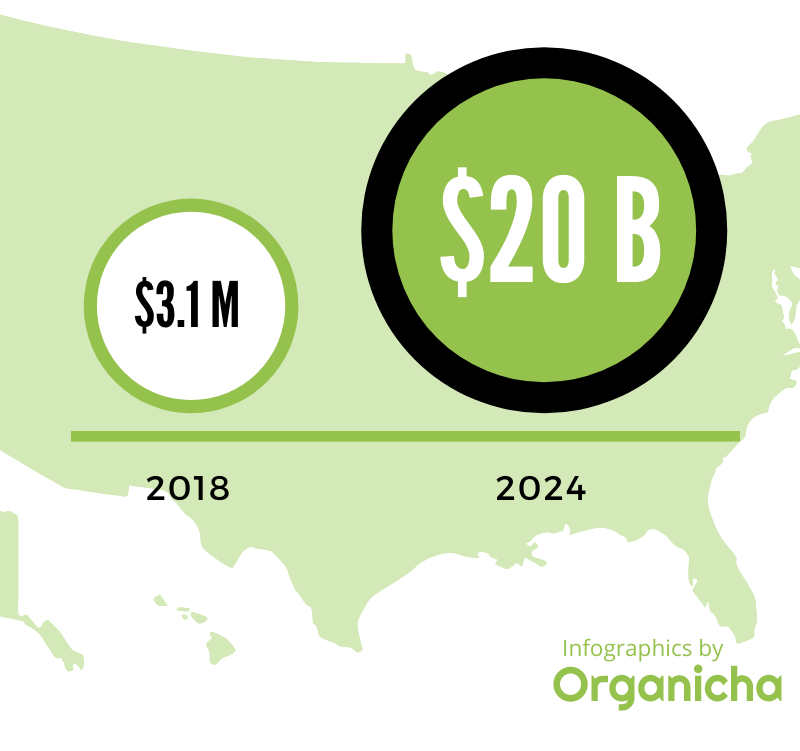
The states with the most CBD sales in the U.S. include California, New York, Florida, and Colorado. It might not be surprising to learn that the sales for these products align with the legalization status of cannabis products in that state.
How many people uses CBD oil in the US?
What may be more interesting is just how many people are using CBD oil.
- 1 in 3 Americans adults have used CBD.
- 66 % of the U.S. population are familiar with CBD products.
- 40% of CBD users utilize CBD products for reducing pain.
- Secondly, 20 % of users apply CBD products to help with anxiety
- For 11% CBD is used for achieving better sleep.
- 28% of all CBD users are using their CBD products daily.
More and more people seem to be using CBD to replace prescription or over-the-counter medicatinos for various afflictions.
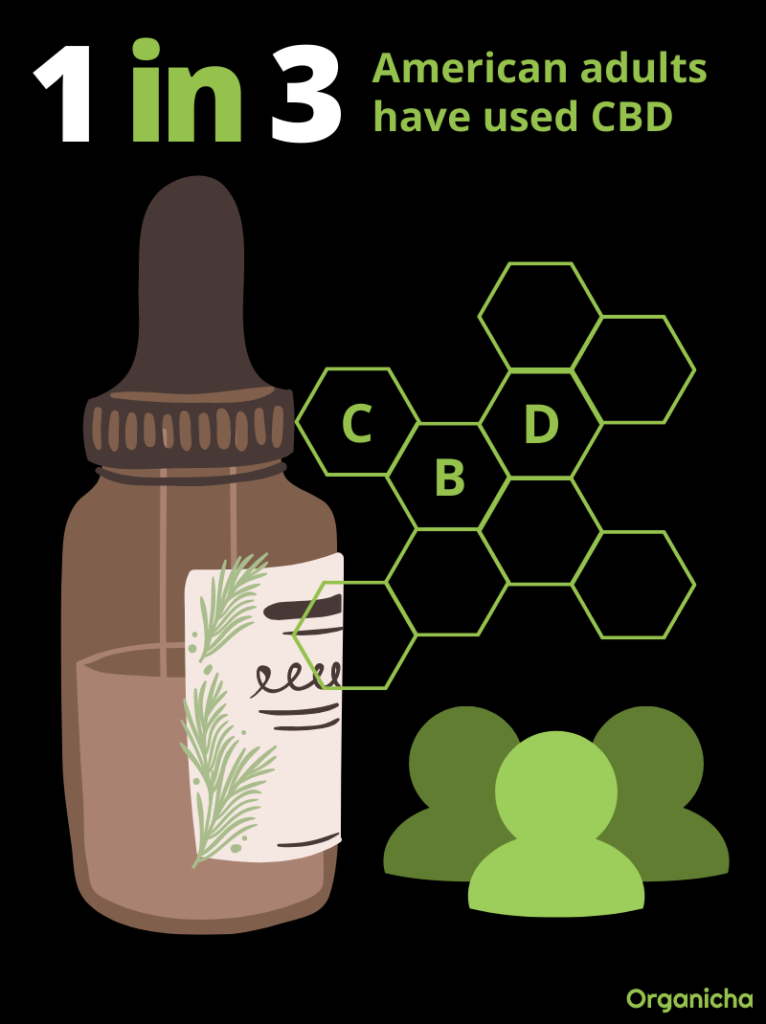
Where to buy CBD oil?
One reason for the historic rise in popularity of CBD products is their availability.
- Access to CBD oil has increased in recent years by 80%.
- CBD products are provided by over 1,000 different brands currently on the market. Some top brands include Charlotte’s Web, Bloom Farms, Care by Design, and Kiva.
- When it comes to where CBD users buy their products, 40% purchase CBD from a dispensary, 34% from retail stores and 27% purchase online retailers.
- 6.4 million Google Searches for CBD were conducted during April 2019.
Sales by U.S. States
- In 2019 California was the top state market for CBD sales in the United States having an estimated sale of 730 million U.S. dollars.
- Secondly and thirdly was the states Florida and New York selling respectively for $291 million $215 million.
What do people think of CBD?
- 68 % of Americans are currently in favor of cannabis legalization, according to survey by Gallup, 2020.
- The FDA has approved only one CBD product as of now. The prescription drug is for treating two rare and severe forms of epilepsy.
- Today, the FDA says “CBD products are being marketed with unproven medical claims and are of unknown quality.”
So now that you know the many suggested health benefits of CBD oil as well as the statistics about CBD use growth, we’ll next explore which demographics make up the growing CBD consumer base. Be ready for a few surprises!
Who Uses CBD Oil?
There are some interesting CBD demographics to explore.
- 14% of Americans are using CBD products, currently.
- 26% of the U.S. population have tried CBD once or more in the last two years.
CBD Statistics by age
In terms of CBD age groups, younger people tend to use these products more frequently.
- 20% of U.S. adults aged 18-29 personally use CBD products, with the percentages decreasing as the age groups progress. Here follows:
- 16% (ages 30-49) use CBD
- 11% (ages 50-65) use CBD
- 8% (>65 years) use CBD
These percentages double when viewed as members of the CBD market.
- The 18-29 years age group makes up 40% of the market.
- The 30-44 years age group makes up 32% of CBD users.
- 45-59 years age group makes up 23% of CBD users.
- >60 years making up around 15% of CBD users.
Millennials vs Boomer and CBD use
- 32% of millennial CBD users prefer to use CBD for stress and anxiety. The same applies for only of 12% of ‘boomers’.
- Boomers in term, prefer to use CBD for joint pain (42%), which applies for just 15% of millennials
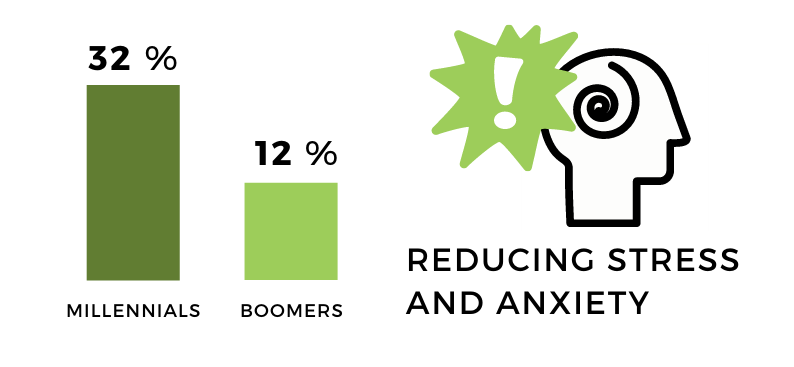
CBD Genders: How is CBD used by men and women?
- Significantly, females make up 55% of CBD users.
- The largest CBD survey found that women are more likely to start using CBD oil and tend to be more loyal to a CBD brand if they find it effective.
- Women don’t just use CBD. Over 75% of CBD brands have women as their founders or general managers.
- 70% of CBD direct sellers are also female.
CBD oil for animals and pets
Another, somewhat more unorthodox, area of CBD use lies with our furry friends!
- One of the fastest-growing CBD sectors is CBD pet supplies.
- While the total hemp pet product market was valued at $32 million in 2018, CBD pet goods alone are predicted to reach $125 million by 2022.
- CBD products are expected to branch out from traditional cat and dog offerings to servicing horses and other domestic animals.
With more and more U.S. adults and pets adopting CBD oil, we’ll explore which are the most popular forms for consumption by the public.
How People Prefer to Take CBD Oil
There are many different forms of available, with the preferred methods determined by what the user is consuming the product for. The various CBD administration modes include oils and tinctures, topical ointments and creams, infused beverages and foods, and vaporized solutions, among others.
CBD popularity by method
- CBD vitamins sold for 37.9 million U.S. dollars in U.S. convenience stores while sleeping remedies had sales of 10.8 million dollars in 2019.
- According to surveys, nearly 50 % of CBD users prefer oils, lotions/balms, and gummies.
- The marked for CBD edibles is growing. 17% of CBD users prefer CBD-infused food, such as chocolate.
- The most popular use of CBD is capsules/tablets (18%)
- Vaping accounts also for one of the more popular uses of CBD (13%)
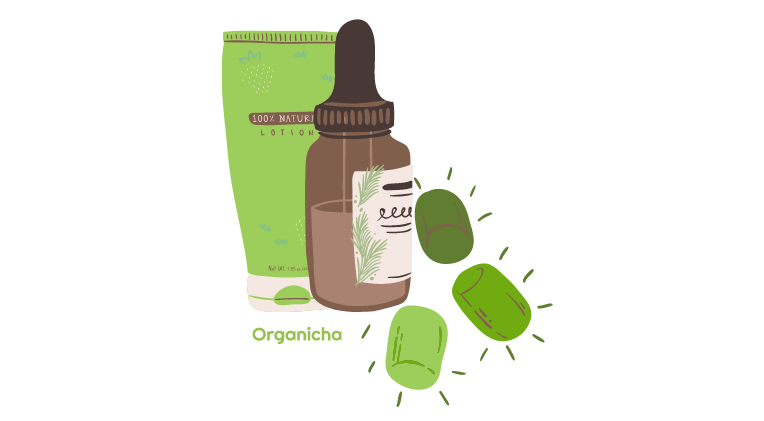
Reports differ on the most popular form of CBD consumption. One survey found edible gummies and other CBD infused food and drink to be the most popular. Another showed CBD oil cartridges for vaping were used by 54% of their participants. This is perhaps because of the fast absorption of CBD through the lungs.
One of the fastest-growing methods of taking CBD is through oils and tinctures, administered by a dropper under the tongue, scientifically known as sublingually. This results in the CBD taking effect in around 20 minutes. Creams allow it to be absorbed by certain receptors under the skin, particularly for joint or muscle pain. Transdermal patches are also used to release small amounts of CBD over an 8 to 12 hour period. These patches differ from other topical forms of CBD by being released into the bloodstream through the dermal barrier.
One thing is sure: while there are many ways to utilize CBD products, most forms are rising in popularity. As more research is done and more consumers enter the market, perhaps some CBD products will emerge as the most popular. For now, it seems the multitude of ways to use CBD are all growing with their customer bases.
Insights on How CBD Oil is Used for Health
Many of the far-reaching health effects of CBD oil stem from its properties as an anti-inflammatory agent. Inflammation lies behind many chronic pain conditions, such as arthritis, muscle strains, non-specific low back pain. But not only that – CBD’s also has an effect on the central nervous system and the brain. Consumers are using such effects to reduce anxiety, depression, seizures; even long term disorders such as PTSD, MS, and Parkinson’s Disease have the potential to benefit from the ‘calming’ properties of CBD.
- For a study og 72 adults patients suffering from anxiety or poor sleep, 79.2% saw a decrease in anxiety scores within one month of taking CBD in capsule form
- Also, 66.7% of patients improved their sleep scores within the same month.
In popular culture, CBD is being used by many people as a kind of panacea. Whether it’s a headache, inability to sleep, or just a way to unwind and relax after a stressful day, CBD is considered a quick and easy way to relieve pain and tension in the body.
CBD is legal on the federal level, however, because the FDA is still studying it, some states still restrict its use. It is probably more likely that the increase in CBD products’ uptake will result from more people simply trying the products than by their approval from governing bodies. Perhaps this will be more true of the younger demographic, which makes up the largest slice of the product’s customer base.
We’ve mentioned that CBD oil seems to have a vast amount of suggested health benefits and is popular among consumers in many forms for many reasons. But what about the downsides? It is important to get a complete picture of any supplement by also discussing its side effects.
Does CBD Oil Have Side Effects?
Like any form of supplement, CBD can have various side effects. Some of the minor side effects experienced by CBD users have included dry mouth, appetite changes, eye irritation, and fatigue. Other common side effects associated with CBD products include elevated liver enzymes (casing liver injury), GI distress, or rash.. Many of these side effects, when reported, don’t have dire consequences on health, but they may disrupt an individual’s routine through inconvenience.
- 74% of CBD users report that they feel no side effects.
What may be of more concern is the interaction of CBD with other drugs. In the same way as grapefruit, CBD may raise levels of other medications in the bloodstream. It is crucial to reconsider the use of CBD if you are taking other medications, and advice from a medical professional is advised prior to trying it.
Much of the concern around CBD stems from its relative infancy in the market. CBD can be sold because it is marketed as a supplement rather than a medication. The issue with this is that many CBD products lack the research needed for approval by the FDA. Only one CBD product has FDA approval, a product used for two rare forms of epilepsy.
This is the case with many newer health products, however. The meteoric rise in popularity of CBD products will ensure that the preclinical evidence supporting the many advantages of CBD is developed further. In the coming years, a plethora of research will undoubtedly be released, allowing consumers to feel confident in trusting their favorite CBD brands and products.
Finally, we’ll explain some of the unique rising trends in CBD oil use in 2020, and where we expect to see the industry go in the coming few years.
Rising Trends in CBD Oil Use
One of the interesting things about CBD use is how people seem to be replacing traditional medications with this new alternative. As many as 22% of CBD users have used it to replace prescription drugs; a third of these individuals use CBD oil to replace opioids. In the same vein, 80% of CBD users find their chosen products very effective, and 52% of CBD consumers consider their CBD to be more effective than over-the-counter alternatives.
How about where people are buying CBD oil? Currently, CBD sales statistics show the bulk of the market share goes to online retailers – around 41% – with natural retail stores and smoke outlets selling 20% and 28%, respectively. The large majority of sales being online may change as more physical retailers start to stock these products – so keep an eye out as CBD oil becomes available in a store near you.
Dosages of CBD are expressed as milligrams and vary according to which form you are taking. Recommended dosages will depend on your weight and the severity of your symptoms. Again, follow recommendations from a qualified health professional, and be aware that it is better to start with a lower dose to determine your product’s tolerance.
As for CBD products that contain THC, up to 68% of people who use CBD also use THC products. In fact, most CBD users do not limit themselves to just one product but instead find relief in a combination of several CBD and THC products. An interesting emerging area of CBD use is in athletes. Studies are starting to be done to use CBD oil to treat pain and muscle damage commonly experienced in many sports. The trick in this industry is drug testing regulations, with cannabis being a banned substance in most sporting organizations.
Perhaps we’ll see an evolution in the definition of non-psychoactive, non-addictive substances, such as CBD in the athletic space soon.
What is CBD Oil?
One of the essential factors in the CBD industry’s growth will be the education of the public on exactly what CBD is – and what it is not.
CBD, or Cannabidiol, is a natural constituent of the cannabis plant. CBD is one of over 100 of these ‘cannabinoids’ and is the most well-recognized, along with its psychotropic counterpart, THC.
Commercially sold CBD most often comes from the hemp plant, a breed of cannabis plant used for many purposes. These include making clothing, insulation, protein supplements, and many more traditional functions.
It is important to separate the hemp plant and CBD from the marijuana plant, with its higher THC levels. THC is the compound that produces the mind-altering effects associated with marijuana use.
The types of CBD products discussed in this article have been identified as “safe” from these effects by the World Health Organisation. They also do not contain any addictive substances which may cause potential abuse.
CBD is typically extracted from the flowers and buds of the cannabis plant. CBD acts on receptors in the brain which help facilitate functions regarding pain, mood, appetite, movement, cognition, and inflammation.
After defining CBD oil as a safe and relatively effective substance, without the psychoactive or addictive properties of its somewhat infamous relative, THC, we will explore the many reasons people have for using CBD for their health.
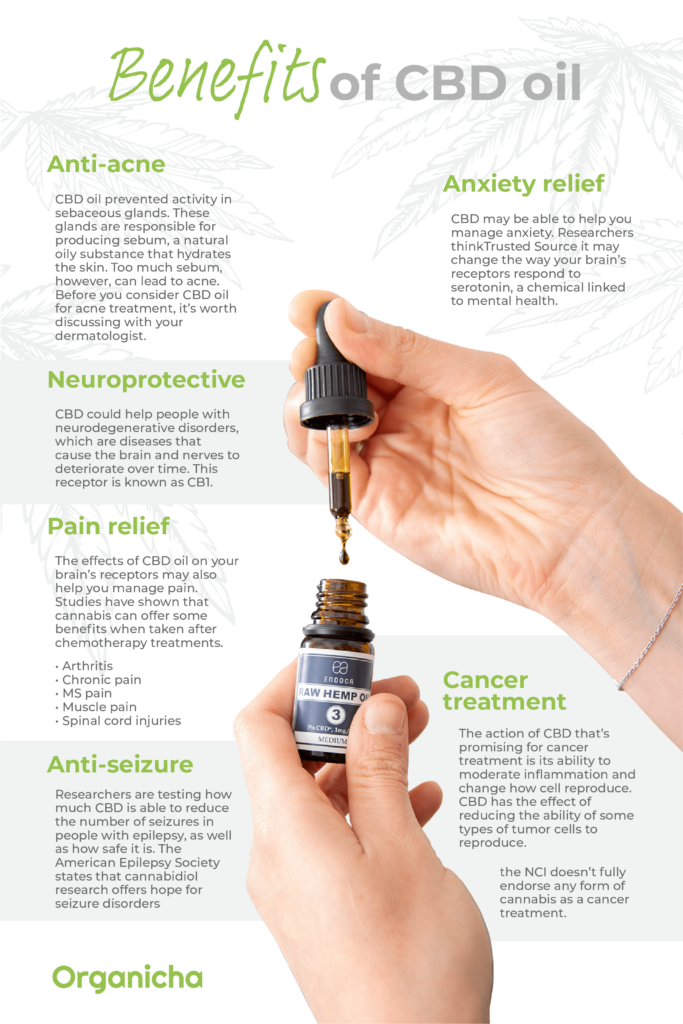
Therapeutic and Medicinal Uses of CBD Oil
While the scientific evidence for most of CBD oil’s potential effects is in the preclinical stage, CBD holds promise as a treatment for many ailments. The most common conditions being treated with CBD oil as an alternative therapy are pain, inflammation and neurological/mental health conditions.
Concerning pain, CBD is suggested to have powerful anti-inflammatory properties. This has helped relieve pain for people with arthritis, low back pain, sciatica, muscle strains, surgical incisions, and migraines.
In terms of neurological and mental health issues, CBD is being used to relieve anxiety, depression, and insomnia symptoms. It even has suggestive neuroprotective properties, reducing the severity of spasms and seizures in some with epilepsy and multiple sclerosis.
Less common, though no less useful benefits of CBD oil are being studied in regards to cancer. The ability of CBD to reduce the associated nausea and vomiting frequently suffered by those undertaking chemotherapy is valuable. Although these are some of the main uses of CBD products currently, there are dozens of other effects from CBD being investigated. A few examples include its use as an antibacterial agent, its ability to alter blood sugar and cholesterol levels, and its immune-boosting properties.
With the myriad of advantages of CBD oil being discovered by more and more people in recent years, it’s no wonder that CBD popularity is skyrocketing.
Conclusion
We will be keeping a keen eye on the CBD industry’s development, as it seems only to be the beginning for this rapidly growing market. As new research and new applications for these products are discovered, researched, and regulated, the CBD industry will continue to compete as a natural remedy for many common afflictions.
We hope this article has provided some useful CBD fun facts and informed you on some of the most popular CBD products on the market today. It seems that the sky is the limit in the CBD industry, so keep an eye on this space!
Let us know what you think about CBD oil, your favorite CBD products, and what you use them for in the comments below!
Jesse Hyson is an accredited exercise and sports scientist. He is currently completing clinical residency for a Master of Clinical Exercise Physiology at Charles Sturt University, Australia.
